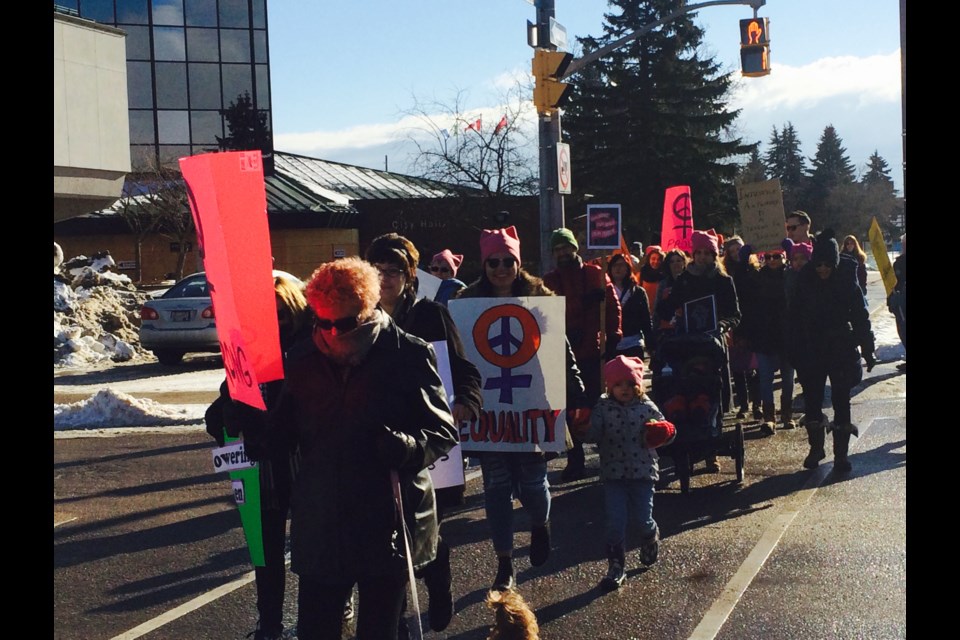The one-year anniversary of the Women's March was recognized around the world Saturday.
In North Bay, roughly 60 people, children, men and women, gathered at City Hall using the theme 'Women March On: Defining Our Future,' to push for equality and empowerment.
Local organizer Meghan Walsh, a counsellor at Amelia Rising, explained that the day was in part about empowerment, 'Looking Back; Marching Forward'
"The march started off last year addressing the inauguration of Donald Trump who is clearly a misogynist. This year we are looking back at what happened and looking forward to the policies and the policymakers and the institutions, that are culturally and socially kept in place, and how we might change those."
Brenda Quenneville, Executive Director Amelia Rising Sexual Assault Centre of Nipissing, sent a message to community leaders.
"We're trying to help identify for our city leaders, areas in which they can move forward in creating a more safe and inclusive community," said Quenneville who went on to speak about her research into casinos and the potentially negative impact it could have on cases of domestic violence.
"The research I've done demonstrates there will be an increase in domestic violence. I have presented that to the city council and made it really clear that if they go ahead with the casino, we are going to see a rise in domestic violence, and that's not something that our community services and the community should be asked to take on."
Quenneville went on to say changes are needed to the Police Services Act of Ontario.
"I'm hoping that City Council will use their collective voice to go to the province about the Act. While I think it is really important to protect our police officers, when you have a known assaulter and abuser on the police force, we need to remove that person, because we can't trust our police service, if we can't at least have officers responding who are not abusers".
Experts say events currently going on in Hollywood and the recent case involving former Team USA Olympic gymnastics sports doctor, Larry Nassar, has "created a shift", giving men and women the courage to speak out, recognizing that reporting an assault is an option. They are not alone.
"I think there has been a very significant shift in the voice around sexual violence and assaults and what women experience," said Psychiatrist Lorin Young, last year's organizer for North Bay.
"I think the MeToo movement shows the extent of how sexual assault has affected women and men in our communities. It is that courage they get from knowing other people have experienced this, that they can speak out loud. I think it is important for people to know that whether you're a woman or you're somebody who is homosexual, bisexual, a marginalized group who is just coming from another country and just fighting to have a better life, that they are not alone. There are people who are willing to stand with them, next to them, to walk with them. It's important to remind us that there is hope, that we can come together and continue to make change and fight against a lot of the negative rhetoric and actions that have been occurring in the United States and elsewhere," said Young.
"I see it in my practice. I think probably 85% of the women that I see, and many of the men too who have been sexually assaulted, abused as children, or later on in life, certainly the trauma from that is significant and it affects one throughout their life. But it is also the day to day oppression and the much more mild sexism that occurs on a day to day basis, that makes women feel like they can't speak up, that they can't be as great a member of society and recover because they perceive that there's not as good support for them that I would like for there to be, and certainly there ought to be in our society."
Mary White, a survivor of sexual assault and gender based violence, shared her personal journey.
"We are lacking access to trauma informed and timely care for our most marginalized folks, especially anyone who has experienced sexual violence. As a service user, I expect non-judgemental and trauma informed care. Yet what I received as a survivor here in this community was not that. There are long wait times and women have to fight to get the care they need and deserve. They often just walk away. I eventually was able to find the service providers I needed and who were not judgmental," said White.
"I'm sharing parts of my story in hopes that it draws attention to the large gap in our system, here in our local community The issue is global, but it's essential that we see it as local. I'm hopeful for a future inspired by all the grassroots activism that has brought us to this very pivetal period. Survivors are speaking out and talking back to sexual violence. When we push back and say we will not accept rape culture, we will live in a consent culture."
Keith Blair walked side by side with friends in a show of solidarity.
"We're here to support the idea of equality for all, and all genders. It's about understanding whether you're female or male, there are allies wherever you go. I think having a voice is very important, and knowing there are people available to support and represent you."
Following her talk, Lorin Yong encouraged people to speak up.
"It is estimated that at least one in three Canadian women will experience sexual assault in their lifetime. Assault is more likely if you are an aboriginal women, or a woman with a disability and these rates are not decreasing, they've actually remaining steady for the last ten years or so, while other types of violent and non-violent crimes have decreased in the same period."



